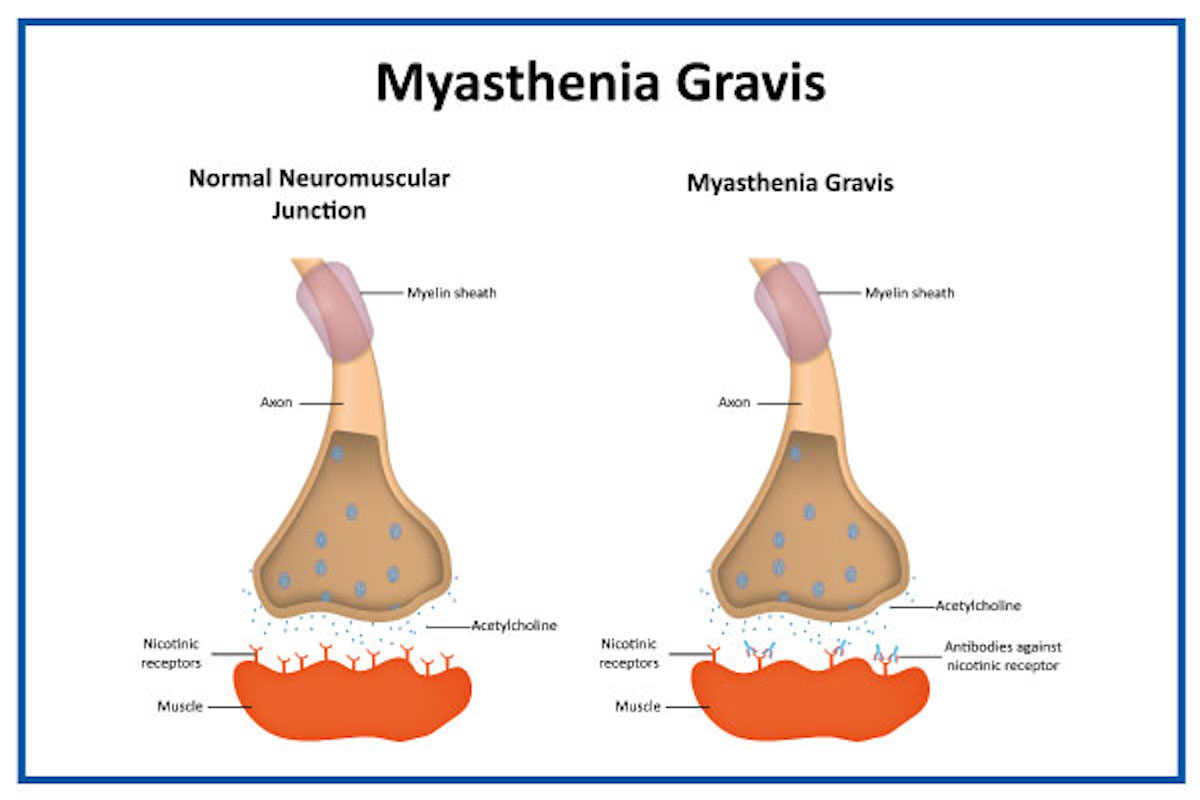We all have tired and sore muscles from time to time, nothing to worry about, am I right? Well, this isn’t always the case. As, muscle weakness can be a serious and life-threatening symptom of a disease, called myasthenia gravis (MG). It affects the muscles responsible for movement and breathing and is estimated to affect around 14 to 20 people out of every 100,000 in the United States. Therefore, it’s important to be aware of the causes, symptoms, and treatment options for myasthenia gravis. Especially for those who may be at risk or have already been diagnosed with this condition.

What Is Myasthenia Gravis?
Myasthenia gravis (MG) is a medical condition caused by the body’s immune system attacking itself. This autoimmune disease affects the communication between nerves and muscles, specifically at the neuromuscular junction. People with MG can lose the ability to control their muscles voluntarily, causing varying degrees of muscle weakness and fatigue. MG is a lifelong neuromuscular disease that requires proper management to help manage symptoms and improve quality of life. There are several types of myasthenia gravis (MG), including:
- Ocular MG, which affects the eye muscles
- Generalized MG, which affects muscles throughout the body
- Congenital MG, which is present at birth
- Drug-induced MG, which can be caused by certain medications
Additionally, MG can also be classified based on the presence or absence of specific antibodies. Understanding the type of MG a person has is important because it can impact the severity of their symptoms and the treatments that may be most effective for them.
Causes of Myasthenia Gravis
The exact cause of myasthenia gravis (MG) is not fully understood, which means that not everyone diagnosed with MG, will have a clear reason, for why they got it. However, it is believed to be caused by a combination of genetic and environmental factors. The most common cause of MG is an autoimmune response in which the body’s immune system mistakenly attacks the acetylcholine receptors (AChRs) on the muscle cells that receive nerve impulses. This interference leads to weakness and fatigue in the affected muscles. Other less common causes of MG may include:
- Thymoma – a tumor in the thymus gland, which is located in the chest and plays a role in the immune system
- Thymus hyperplasia – an enlargement of the thymus gland
- Medications – certain drugs can cause MG-like symptoms, although this type of MG is usually reversible once the medication is stopped.
Myasthenia gravis can affect anyone, but certain factors may increase a person’s risk of developing the condition. Women under the age of 40 and men over the age of 60 are more likely to develop it. People with a family history of MG or other autoimmune diseases, such as lupus or rheumatoid arthritis, may also have a higher risk. Other factors that may increase the risk of MG include certain infections, such as Epstein-Barr virus or cytomegalovirus, exposure to certain medications or chemicals, and other underlying health conditions such as thyroid disorders.

Symptoms of Myasthenia Gravis
MG affects the muscles that control movement and can cause a range of symptoms that vary in severity. The most common symptoms of MG include:
- Muscle weakness – which can affect the eyes, face, neck, arms, and legs. Weakness can be intermittent or persistent and can worsen with activity.
- Fatigue – which often accompanies muscle weakness and may be more noticeable after periods of activity.
- Difficulty speaking and swallowing – this can result from weakness in the muscles responsible for these actions, which can lead to slurred speech, difficulty chewing, and swallowing.
- Drooping eyelids – also known as ptosis, is a common early symptom of MG, caused by weakness of the eye muscles.
- Double vision – also known as diplopia, can occur when the eye muscles are weak or not working together properly.
- Shortness of breath – which can occur if the muscles responsible for breathing are affected, leading to difficulty breathing and respiratory distress.
Less common symptoms of MG may include muscle cramps, muscle twitching, and neck weakness. It’s important to note that not everyone with MG will experience all of these symptoms, and the severity and frequency of symptoms can vary widely.
What are Complications of Myasthenia Gravis?
Unfortunately, (undiagnosed) MG can lead to a range of complications that vary in severity and can affect various parts of the body. Severe complications of MG can include respiratory failure, which can occur if the muscles responsible for breathing become too weak to function properly. This can be life-threatening and requires immediate medical attention.
MG can also lead to difficulty swallowing, which can increase the risk of choking and aspirating food or liquids into the lungs, leading to pneumonia. Other complications of MG may be less severe but can still impact a person’s quality of life. For example, MG can cause difficulty speaking, which can make it hard to communicate with others. It can also cause muscle weakness that affects the ability to perform daily activities, such as walking, bathing, and dressing.
Are There Any Treatment Options?
In case you or a loved one is experiencing these symptoms, you should contact your professional healthcare provider ASAP. As early diagnosis and treatment are important in managing symptoms and preventing complications. The disease can be difficult to diagnose, because its symptoms can be similar to those of other conditions. However, there are tests to make the right diagnosis. Think of blood tests, edrophonium tests. Once the diagnosis myasthenia gravis is made, your healthcare provider can set up a suitable treatment plan. Treatment options include:
- Medications – such as acetylcholinesterase inhibitors, immunosuppressants, and steroids.
- Therapies – including plasmapheresis and intravenous immunoglobulin to remove or block the antibodies that are causing the immune system to attack the muscle receptors.
- Surgery – such as thymectomy, which involves removing the thymus gland, may be recommended in certain cases.
- Lifestyle modifications – including avoiding triggers that can worsen symptoms, getting enough rest, and eating a healthy diet.
Treating MG is different for each person and depends on the type and how severe it is, along with other medical conditions. It’s important to work with a healthcare provider to create a treatment plan that works best for you and your symptoms. Need information about this condition, possible treatment options, or do your symptoms not match those listed above? Then search further here quickly:

